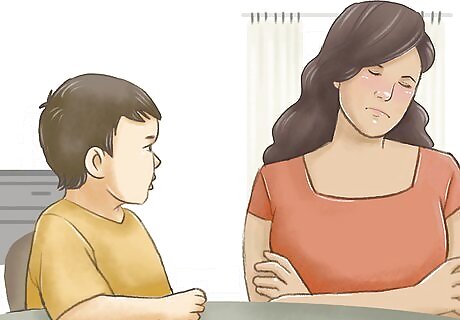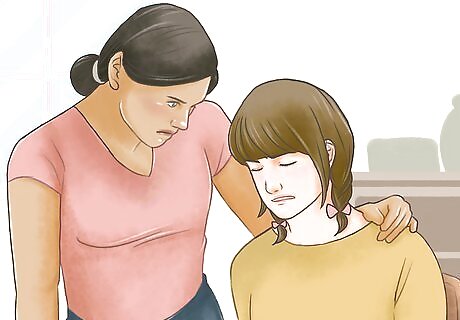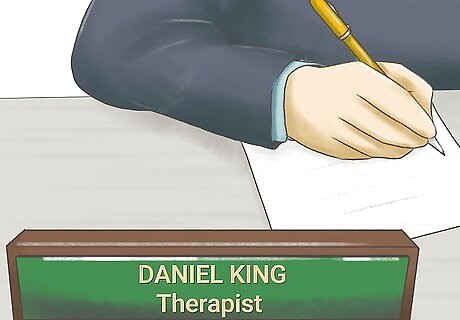
views
Noticing Sad Behavior

Monitor any changes to their normal behavior. Sadness will often cause some subtle changes in the way your parent acts. For instance, they might normally be very talkative, but lately they have been quiet. Pay attention to any marked changes in their usual behavior or routines. Consider whether they are ruminating on an event or conversation. This may also be a sign of sadness.

Watch for signs of crying. A sad parent may cry a lot. You might notice that their eyes are swollen and red. There may be used tissues surrounding their favorite chair. You might even see them crying. This can be disturbing, but crying isn’t a bad thing. It means they are letting painful emotions out.

See if they have trouble listening or paying attention. Many people who feel sad may be lost in thought over what’s troubling them. For this reason, you might notice that your parent has difficulty staying focused during a conversation or when working. For example, you might be telling your mom about your day, but you notice her staring off into space. You might ask, “Mom? Did you hear me?” and then she snaps back to attention.

Notice if they withdraw from friends and family. A sad person may not want to be in the presence of others. They may want to be alone with their thoughts, or they simply may not feel like pretending to be happy. Your mom or dad may go off on their own a lot, away from others. You might also notice them not taking phone calls or turning away visitors. Any form of isolation is a cause for concern, so consider how often your parent is alone.

Check their sleep and eating habits. If your parent is sad, they may have difficulty sleeping, which means you hear them moving around in the small hours of the night. They may also sleep too much and not want to get out of bed. In addition, a sad parent may not eat very much at dinnertime or they may eat a lot of junk food to numb their feelings.

Consider any stress in their life. Major and minor sources of stress can contribute to depression, so consider what has been happening in your parent’s life recently. If they have endured any major stressors, such as losing a loved one, moving, or going through a breakup or divorce, then consider how they are coping.

Note the side effects of their medications. Some medications may result in feelings of sadness or depression, so this is another important thing to consider. Check to see what side effects your parent’s medications may have to help you determine if they are at a higher risk of depression.
Trying to Help

See if they want to talk. If you spot signs of sadness in your parent, it may be nice to reach out to them. Go to them and let them know that you’ve noticed a difference in their behavior. Ask if they would like to talk to you about it. If you think you understand the cause of the sadness—like a death in the family, a job loss, or breakup or divorce—you might ask if they are feeling sad about it. For example, you might say, “Dad, I know you’re going through a tough time since Mom left. I’m here for you. Would you like to talk about it?” Your parent may not want to talk to you about what’s making them sad because they probably don’t want you to worry.

Ask what you can do to help. Besides talking to them about it, you might also see if you can assist in some other way. If you know your parent is comforted by certain things, bring them to them. Otherwise, you might just come out and ask how you can help. You might bring your mom her favorite blanket and make her a cup of chamomile tea. You might also say, “I can tell you’re sad. What can I do to help?”

Give them some privacy. In some cases, no matter what you try, your parent may just want to be alone. That’s perfectly okay. Taking time alone to fully process negative emotions can help them move through them. If your parent dismisses your offer to help, just give them some space. You might say, “Okay, I’ll give you some space. But I’m right downstairs, if you need me.”

Recognize that it's not your responsibility to fix things. It's perfectly normal to feel worried about your parent and want to help them feel better. However, you should know that isn’t your responsibility. Try to keep living your life as your normally would. For instance, you can keep yourself busy by doing your homework and chores, engaging in extracurricular activities, and hanging out with friends.
Monitoring Them Long-Term

Know the difference between sadness and depression. It’s important to be able to distinguish sadness from depression, since these two emotional states are often lumped together. The key is to recognize that sadness often has a particular reason, like a loss of some kind. Depression, however, may occur without a clear reason, and the person seems sad about everything. Depression is often characterized by feelings of intense sadness, including feelings of helplessness, hopelessness, and worthlessness. These feelings can last for many days to weeks and they may interfere with a person’s daily activities. If there is no clear reason behind your parent’s sadness, they may be struggling with depression and need professional help.

Watch for signs of unhealthy coping. Your parent may have trouble dealing with their sadness and turn to negative coping strategies. Abusing alcohol or drugs, overeating, or gambling may help them numb their feelings of sadness. However, escaping the negative emotion can actually worsen the problem. If you have seen your parent abusing alcohol or drugs or turning to other unhealthy coping strategies, talk to another adult about what you’ve seen.

Explain your concerns to your parent. If your parent’s sadness carries on for weeks and they don’t seem to be getting any better, they may have depression. You might go to them and tell them that you are worried. Urge them to see a doctor or mental health professional. You might say, “Dad, I’m really worried about you. You’ve been missing work a lot and I know you’re not sleeping. I would feel better if you saw a doctor.”

Talk to a trusted adult. If your parent does not take your advice, you might get another adult involved. Choose someone you trust such as another parent, an uncle or aunt, a grandparent, or a counselor at your school. Tell them what’s been happening with your parent. For instance, you might say something along the lines of, “Grandma, I’m really concerned about mom. She hasn’t been eating, sleeping, or even leaving her room. I think she needs help.” If the adult you talk to doesn’t do anything, tell someone else.

Ask your parent to let you see a therapist. A trained mental health professional can help you cope with the stress of having a parent who is sad or depressed. Ask your parent to set up an appointment so that you can talk to someone about what's happening, or see if another relative can do this. Plus, this person will generally keep whatever you say to them confidential unless they believe you or someone else is in immediate danger.




















Comments
0 comment